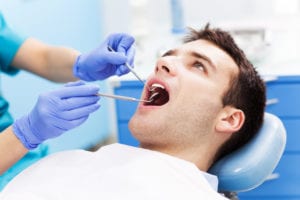Written by Taylor Woosley, Staff Writer. Results of the cross-sectional analysis using data from the Hamburg City Health Center shows a significant association between a higher anti-inflammatory diet score and lowers odds of periodontitis risk (p < 0.001).
 Periodontitis is one of the most common inflammatory conditions, representing the sixth most prevalent condition worldwide1. It is a chronic multifactorial disease associated with accumulation of dental plaque and characterized by progressive destruction of the teeth-supporting apparatus2. There is significant evidence to support independent associations between periodontitis and several non-communicable diseases including diabetes, cardiovascular disease, and chronic kidney disease3.
Periodontitis is one of the most common inflammatory conditions, representing the sixth most prevalent condition worldwide1. It is a chronic multifactorial disease associated with accumulation of dental plaque and characterized by progressive destruction of the teeth-supporting apparatus2. There is significant evidence to support independent associations between periodontitis and several non-communicable diseases including diabetes, cardiovascular disease, and chronic kidney disease3.
Diet is an important factor that can affect inflammatory processes4. Adherence to proinflammatory dietary patterns is associated with an increased inflammatory burden in periodontitis lesions5. It has been demonstrated that the reduction of oxidative stress, along with an increased intake of antioxidants, has beneficial effects on gingival and periodontal inflammation through modulation of host immune responses6.
Lieske et al. conducted a study to analyze the association between an anti-inflammatory dietary score and the incidence of periodontitis using data from the Hamburg City Health Study (HCHS). The HCHS is an ongoing population-based, prospective cohort study collecting health data regarding disease burden from 45,000 German citizens aged 45-75 years. Subject’s dietary intake was collected using a validated food-frequency questionnaire (FFQ) which covers 102 food items, nutrients, and supplements consumed in the last year. Adherence to an anti-inflammatory diet was assessed following the food consumed in the Mediterranean, DASH, and MIND diets and were measured using the Mediterranean Diet Adherence Screener (MEDAS). A Kruskal-Wallis test was utilized to evaluate the various diets’ association with the inflammatory markers hsCRP and IL-6.
Participants received a full dental examination by a trained examiner and the plaque index and bleeding on probe was measured and assessed at two sites per tooth. The clinical attachment loss (CAL) was calculated for each individual tooth by analyzing probe depth and recession. The Number of Decayed, Missing, and Filled Teeth (MFT) Index was decided and then all subjects were categorized in one of three periodontitis severity levels: (1) no periodontitis/mild periodontitis, (2) moderate periodontitis, and (3) severe periodontitis.
Further information on confounding variables such as age, sex, education, smoking status, diabetes, hypertension, and cholesterol were included in the analysis. The chi-squared test for categorical variables and the Kruskall-Wallis rank sum test for continuous variables was used to calculate within-group differences. Among subjects, 1453 had none or mild periodontitis, 3580 participants had moderate periodontitis, and 1176 subjects had severe periodontitis. Subjects with severe periodontitis had more cardiovascular risk factors (BMI, smoking, diabetes, and hypertension), higher overall medication intake, along with higher levels of IL-6 and hsCRP (1.77 vs. 1.45 and 0.13 vs. 0.10).
Of the 5642 subjects with complete information regarding dietary information, participants with a lower anti-inflammatory diet presented a higher bleeding on probing score (8.9 vs. 7.1), higher plaque index score (10.4 vs. 5.4), and had a higher risk of periodontitis (22% vs. 16%) compared to subjects with a higher anti-inflammatory diet score. Ordinal logistic regression models show a significant association between a higher anti-inflammatory diet score and lowers odds of periodontitis risk in an unadjusted model (p < 0.001).
Results of the study using data from HCHS suggests that following an anti-inflammatory diet is associated with a reduced risk of periodontitis. Further research should continue to explore the impact of diet on oral health and inflammatory disease progression. Study limitations include the lack of inference of causality of results due to the cross-sectional study design and the potential recall bias of self-reported dietary intake.
Source: Lieske, Berit, Nina Moszka, Katrin Borof, Elina Larissa Petersen, Bettina Jagemann, Merle Ebinghaus, Thomas Beikler, Guido Heydecke, Ghazal Aarabi, and Birgit-Christiane Zyriax. “Association between an Anti-Inflammatory Dietary Score and Periodontitis—Evidence from the Population-Based Hamburg City Health Study.” Nutrients 15, no. 14 (2023): 3235.
© 2023 by the authors. Licensee MDPI, Basel, Switzerland. This article is an open access article distributed under the terms and conditions of the Creative Commons Attribution (CC BY) license (https://creativecommons.org/licenses/by/4.0/).
Click here to read the full text study.
Posted September 5, 2023.
Taylor Woosley studied biology at Purdue University before becoming a 2016 graduate of Columbia College Chicago with a major in Writing. She currently resides in Glen Ellyn, IL.
References:
- Czesnikiewicz-Guzik M, Osmenda G, Siedlinski M, et al. Causal association between periodontitis and hypertension: evidence from Mendelian randomization and a randomized controlled trial of non-surgical periodontal therapy. Eur Heart J. Nov 1 2019;40(42):3459-3470. doi:10.1093/eurheartj/ehz646
- Kwon T, Lamster IB, Levin L. Current Concepts in the Management of Periodontitis. Int Dent J. Dec 2021;71(6):462-476. doi:10.1111/idj.12630
- Sanz M, Marco Del Castillo A, Jepsen S, et al. Periodontitis and cardiovascular diseases: Consensus report. J Clin Periodontol. Mar 2020;47(3):268-288. doi:10.1111/jcpe.13189
- Feng J, Jin K, Dong X, et al. Association of Diet-Related Systemic Inflammation with Periodontitis and Tooth Loss: The Interaction Effect of Diabetes. Nutrients. Oct 3 2022;14(19)doi:10.3390/nu14194118
- Botelho J, Leira Y, Viana J, et al. The Role of Inflammatory Diet and Vitamin D on the Link between Periodontitis and Cognitive Function: A Mediation Analysis in Older Adults. Nutrients. Mar 12 2021;13(3)doi:10.3390/nu13030924
- Altun E, Walther C, Borof K, et al. Association between Dietary Pattern and Periodontitis-A Cross-Sectional Study. Nutrients. Nov 21 2021;13(11)doi:10.3390/nu13114167
